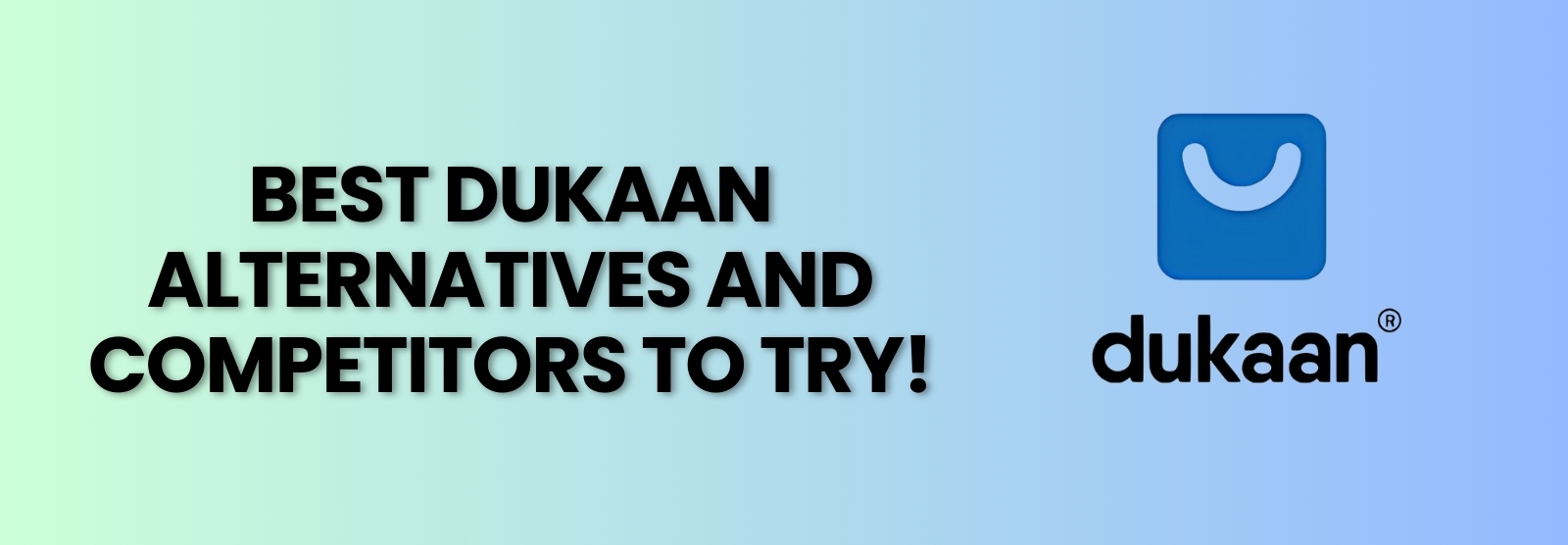
Top 5 Best Dukaan Alternatives and competitors to try in 2025 & Upgrade Your Business with Aasaan
As the e-commerce platform landscape continues to evolve, many entrepreneurs and small business owners are searching for robust alternatives to Dukaan.
Whether you’re dissatisfied with the platform’s features, pricing, or simply exploring options to enhance your online store’s capabilities, the year 2025 offers a variety of promising substitutes.
Each platform brings its own unique set of tools and advantages that could be just what you need to elevate your business.
In this article, we will delve into the top 5 competitors and alternatives to Dukaan, helping you make an informed decision about which platform could best suit your e-commerce needs.
Whether you’re looking for more customization, better customer service, or more extensive integration options, our comprehensive guide will assist you in navigating through these alternatives to start selling effectively.
Key Takeaways:
1. Aasaan: Offers AI-powered capabilities, zero transaction fees, and seamless store management, making it cost-effective and efficient for new and growing businesses.
2. Shopify: Known for its extensive toolset, multi-channel selling options, and robust app ecosystem, ideal for scaling businesses.
3. WooCommerce: Provides unparalleled flexibility and customization through its open-source platform, perfect for those who prefer extensive control over their ecommerce store.
4. Wix: Features an intuitive drag-and-drop editor, customizable templates, and built-in SEO tools, suitable for creating visually stunning and functional online stores with ease.
5. BigCommerce: Known for its powerful features, scalability, and no transaction fees, making it a comprehensive solution for businesses of all sizes.
Keep reading to discover which platform might be the game-changer for your online venture in 2025
What is Dukaan?
Dukaan is an e-commerce platform that enables businesses and individual entrepreneurs to set up and manage online stores easily.
It is designed to simplify the process of creating and operating an online shop, offering tools for managing products, payments, and customer interactions without requiring technical expertise.
The platform is particularly popular among small to medium-sized enterprises (SMEs) and has gained attention for its user-friendly interface and quick setup process.
Dukaan offers a flexible pricing model that allows you to start your online store for free. If you need more advanced features, you can choose their paid plans.
For detailed pricing information, including the specific features and benefits of each plan, please visit Dukaan’s official pricing page.
Why Choose an Alternative to Dukaan?
There are several reasons why a business might consider choosing an similar to Dukaan:
- Feature Limitations: While Dukaan provides essential e-commerce functionalities, it might lack certain advanced features that larger or more specialized businesses require, such as extensive customization options or advanced analytics.
- Scalability Concerns: As businesses grow, they may find that Dukaan’s infrastructure does not scale as efficiently or cost-effectively as other platforms that are designed to handle higher volumes of traffic and transactions.
- Pricing Structure: If the pricing model of Dukaan doesn’t align with a business’s budget or growth trajectory, they might look for more cost-effective solutions with different pricing strategies.
- Integration Capabilities: Businesses that require seamless integration with other tools or systems (like ERP systems, marketing tools, or customer relationship management software) may find Dukaan’s integration capabilities limited.
- Regional Support: Depending on geographical focus, businesses might need a platform that offers better localization, supports local payment methods, or provides customer service in local languages.
Key Factors When Considering an E-Commerce Platform
When evaluating different e-commerce platforms, it’s crucial to consider several key factors to ensure the chosen solution best fits your business needs:
- Customization: How much can the platform be tailored to suit specific business needs and customer experiences?
- Usability: Is the platform easy to use for both the merchant and the customer? Consider the learning curve for managing the platform.
- Integration: Does the platform integrate easily with other necessary business tools and systems?
- Scalability: Can the platform grow with your business? It should be able to handle increased products, traffic, and transactions without compromising performance.
- Security: The platform should have robust security measures in place to protect both business data and customer information.
- Customer Support: Good customer support is crucial, especially if you encounter issues that need immediate attention.
- Pricing: Evaluate the total cost of ownership, including setup, monthly fees, and any transaction charges. Consider how these costs align with your budget and financial projections.
- Mobile Compatibility: With the increasing prevalence of mobile commerce, ensure the platform offers a seamless mobile shopping experience.
- SEO and Marketing Tools: The platform should have built-in SEO features and marketing tools to help you attract and retain customers.
Choosing the right ecommerce platform involves balancing these factors with your specific business requirements, budget, and long-term business goals.
Switching from Dukaan? Here Are the 5 Best Ecommerce Platforms to Consider in 2025
1. Aasaan: The Next-Gen Best Dukaan competitor overall
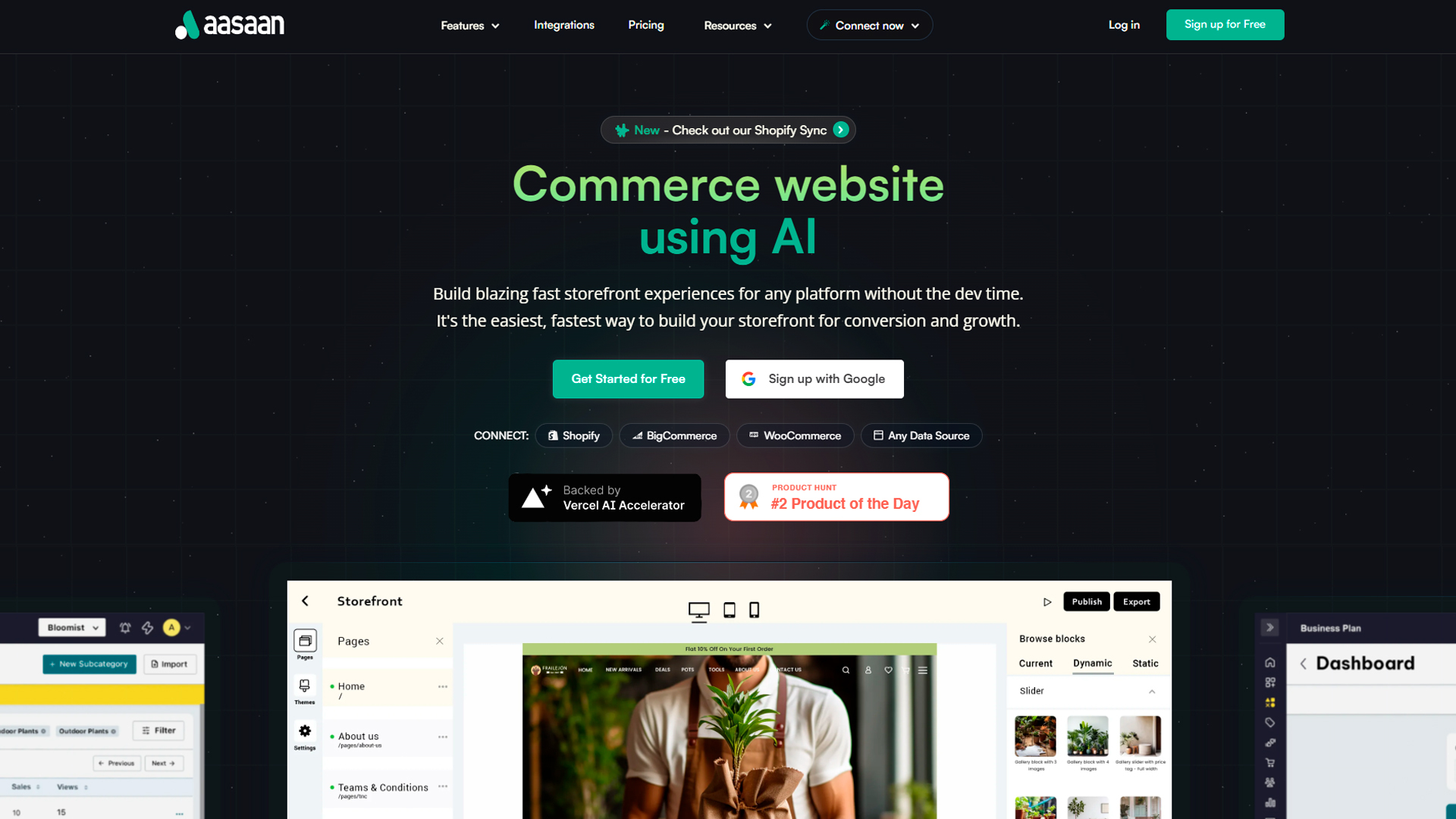
In the dynamic world of e-commerce, getting your online store up and running should be straightforward and cost-effective. That’s where Aasaan comes in ai-powered platform.
With Aasaan, launching your online business is simpler than ever, thanks to our user-friendly platform that eliminates the hassle of transaction fees and infrastructure costs.
Plus, integrating Aasaan with your existing backend is a breeze—no coding skills required!
Why Choose Aasaan?
Forget about the complexities of DIY website builders and the high costs associated with hiring agencies. Aasaan is designed to streamline your operations and boost your sales without breaking the bank.
Here’s why Aasaan stands out:
- Seamless Store Management: Manage your products, orders, and customer interactions with ease through our intuitive interface.
- Themes: Access numerous high-quality themes at zero cost.
- Zero Transaction Fees: Keep more of your profits with no transaction fees.
- Blazing Fast Website Speed: Ensure a smooth user experience with lightning-fast load times.
- Advanced Marketing Tools: Take advantage of built-in features for cross-selling and upselling—without any additional charges. Elevate your marketing game without the extra expense.
- No Plugin Costs: Save on add-ons with all essential features included.
- Automated Content Creation: Generate promotional content and social media posts automatically. Keep your marketing fresh and engaging with minimal effort.
- Optimized for Social Commerce: Easily set up your Instagram Shop and Google Shopping with real-time synchronization, expanding your reach and making it easier for customers to find and purchase your products.
- Marketing and SEO: Built-in SEO features, along with schema, ecommerce events setup and marketing tools like email marketing etc.
- Real-time Analytics: Gain insights into customer behaviors and trends with our real-time analytics. Use this data to make informed decisions that enhance your business strategy.
- Dedicated 5-Star Support: Our committed support team is always ready to help you with any issues, ensuring a smooth and hassle-free experience.
Aasaan is not just an ecommerce platform; it’s a comprehensive solution that supports your business at every step, helping you grow and thrive in the competitive online marketplace.
Launch your online store with Aasaan today and experience the difference!
Pricing:
The Aasaan app offers several pricing plans tailored for different business needs:
- Standard Plan: ₹999 per month (or ₹583 if billed annually). It includes basic e-commerce features and supports up to 2 staff accounts and integrations.
- Premium Plan: ₹2999 per month (or ₹1666 if billed annually). It offers additional features like more inventory locations and up to 10 integrations.
- Business Plan: ₹5999 per month (or ₹3333 if billed annually). This plan provides advanced features including backend API access and unlimited integrations.
- Enterprise Plan: Custom pricing is available upon request, designed for very large businesses needing tailored solutions.
Each plan comes with a free 7-day trial. For more details, you can visit their pricing page.
2. Shopify: Best Dukaan alternatives to try

One of the top dukaan competitors is Shopify. Shopify is a comprehensive e-commerce platform designed to help businesses of all sizes create, manage, and grow their online stores.
It offers a range of tools and features that enable users to sell products online, in physical stores, and across various social media and online marketplaces.
Shopify’s flexibility, extensive app ecosystem, and robust support make it a popular choice among e-commerce entrepreneurs.
Features
Shopify provides a robust set of features to support e-commerce businesses:
- Online Store: Create a customizable online store with various themes and templates.
- Point of Sale (POS): Sell in person and keep inventory in sync with online sales.
- Multi-Channel Selling: Promote and sell products on platforms like Instagram, TikTok, Google, and more.
- Payment Processing: Integrated payment processing with support for multiple currencies.
- Inventory Management: Track inventory across multiple locations, including retail stores, warehouses, and pop-ups.
- Unlimited Products: List an unlimited number of products.
- Advanced Reporting: Access professional reports and analytics to make informed business decisions.
- Gift Cards: Offer gift cards to customers.
- Abandoned Cart Recovery: Recover lost sales by sending reminders to customers who left items in their cart.
Additional Costs
- Domain Name: Around INR 800 to INR 1,200 per year.
- Premium Themes: Typically range from $110 to $350 (approximately INR 9,000 to INR 28,000).
- Apps and Plugins: Additional costs may apply for premium apps and plugins to enhance store functionality.
Pricing:
Shopify offers various subscription plans suitable for different business sizes:
- Basic Shopify Plan: Aimed at solo entrepreneurs. Priced at ₹1,499/month when billed annually.
- Shopify Plan: Suitable for small teams running an e-commerce website. Costs ₹5,599/month when billed annually.
- Advanced Shopify Plan: Designed for scaling businesses. Priced at ₹22,680/month when billed annually.
- Shopify Plus Plan: For more complex businesses with custom pricing starting at ₹1,75,000/month on a 3-year term.
Each plan offers a first-month promotional price of ₹20. Features across plans include multiple inventory locations, localized global selling, and POS options, with more advanced features in higher-tier plans.
For more detailed information, you can visit the Shopify India pricing page here.
Read more: Top 8 Best Shopify Alternatives in India - Find the Perfect competitors!
3. WooCommerce : Best Dukaan competitor to try
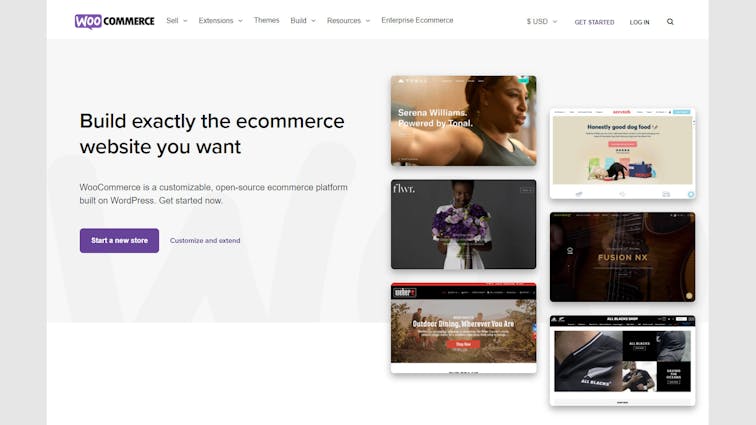
WooCommerce is a popular open-source eCommerce platform built on WordPress, the world’s most widely used content management system (CMS).
It offers flexibility and customization options, making it a top choice for entrepreneurs and business owners in India looking to set up powerful online stores.
Key Features:
- Free Core Software: WooCommerce’s core software is free to use, allowing for basic eCommerce functionality.
- Customizable: Offers extensive customization options through themes, extensions, and developer support.
- Payment Gateways: Integrates with various payment gateways, including WooPayments, Stripe, PayPal, and Authorize.net for your e-commerce website..
- Shipping Options: Supports multiple shipping options and integrations with shipping providers.
- Extensions and Plugins: Offers a wide range of extensions and plugins to enhance store functionality, such as advanced payment gateways, shipping options, and dynamic pricing.
- Themes: Provides numerous free and paid themes to determine the look and feel of the online store.
Pricing:
- Web Hosting: ₹300 – ₹1500 per month (shared hosting plans are suitable to start).
- Domain Name: ₹100 – ₹1000 per year.
- SSL Certificate: Many hosts provide free SSL certificates; otherwise, budget around ₹1000 per year or more for premium SSL.
- WooCommerce Extensions: Start with free extensions and consider premium ones later.
- WooCommerce Themes: Many free themes are available; premium themes usually cost ₹2000 – ₹7000.
- Development and Customization: Hourly rates for developers range from ₹1000 – ₹5000+ per hour; project-based pricing varies depending on the scope of work.
Estimated Costs:
- Basic WooCommerce Store: Approximately ₹500 to ₹3000 per month.
- Scaling WooCommerce Store: Expect around ₹5000 to ₹20,000+ per month.
Payment Gateways:
- WooPayments: No setup charge, no monthly fees; 2.9% + ₹0.30 per transaction for U.S.-issued credit or debit cards.
- Stripe: 2.9% and ₹0.30 per transaction.
- PayPal: 2.9% and ₹0.49 per transaction.
- Authorize.net: 2.9% and ₹0.30 per transaction + ₹25/month.
India-Specific Factors:
- Payment Gateways: Choose gateways that support Indian rupees (INR), such as Razorpay, PayU, and Instamojo.
- Developer Costs: Hourly rates for developers in India typically fall within ₹1000 – ₹5000+ per hour; project-based pricing varies depending on the scope of work.
Additional Costs:
- Transaction Fees: Vary by payment gateway and transaction type.
- Extension and Plugin Costs: Premium extensions and plugins can add significant costs, especially for advanced features.
Overall, WooCommerce offers a flexible and customizable eCommerce solution with various pricing options in India. The costs can vary depending on the scale and complexity of the online store.
4. Wix: Best Dukaan Competitor to Try
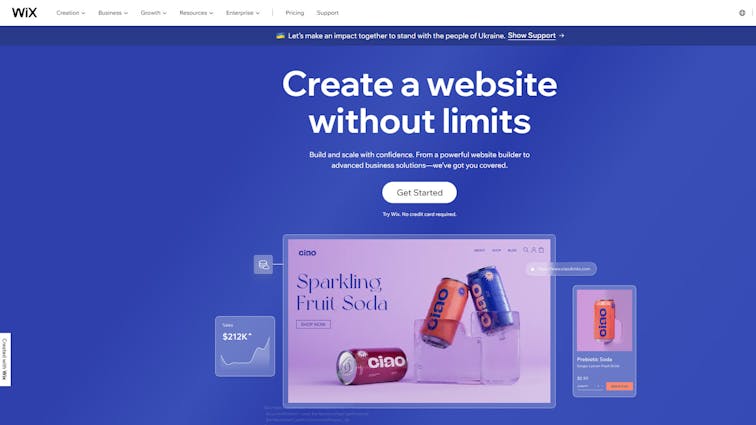
Wix is a versatile website builder that allows businesses of all sizes to create stunning websites with ease.
Known for its user-friendly drag-and-drop interface, Wix has become a popular choice for entrepreneurs looking to establish an online presence without the need for advanced technical skills.
With a wide array of templates, robust e-commerce functionality, and built-in SEO tools, Wix provides a comprehensive solution for building and managing an online store.
Whether you are a small business owner or a larger enterprise, Wix offers the flexibility and scalability to support your growth.
Key Features:
- Drag-and-Drop Editor: Wix’s intuitive drag-and-drop editor makes it easy to design your website exactly how you want it. With no coding required, you can add, move, and customize elements with ease, allowing for complete creative freedom.
- Customizable Templates: Choose from a wide range of professionally designed templates tailored to various industries. Each template is fully customizable, ensuring your website reflects your brand’s unique identity.
- App Market: Access a variety of apps and integrations through the Wix App Market to enhance your website’s functionality. From marketing tools to customer management systems, the App Market has solutions to meet your business needs.
- SEO Tools: Built-in SEO tools help improve your site’s visibility on search engines. Customize meta tags, use SEO-friendly URLs, and access advanced SEO features to boost your site’s ranking and attract more organic traffic.
- E-commerce Functionality: Create and manage an online store with features like inventory management, order tracking, and secure payment processing. Wix’s e-commerce platform supports multiple payment methods and currencies, making it easy to sell to a global audience.
- Mobile Optimization: Ensure your site looks great on all devices with mobile-optimized templates. Wix automatically optimizes your website for mobile viewing, providing a seamless experience for your customers.
- Blogging Platform: Easily add a blog to your website to engage with your audience and improve SEO. The blogging platform includes features like post scheduling, categories, and social sharing to enhance your content strategy.
Additional Costs:
- Domain Name: A custom domain name is essential for branding and can be purchased through Wix or another domain registrar. Costs typically range from INR 800 to INR 1,200 per year.
- Premium Themes: While Wix offers many free themes, premium themes provide additional customization and design options. Premium themes usually cost between INR 2,000 to INR 7,000.
- Apps and Plugins: Enhance your website’s functionality with premium apps and plugins from the Wix App Market. Costs for these add-ons vary, with many offering free and paid versions.
Pricing:
Wix provides several eCommerce plans in India, each designed to cater to different business sizes and requirements:
- Wix Business Basic Plan: Priced at around INR 2,246 per month, this plan is ideal for new or fledgling e-commerce businesses with a low volume of sales. It includes essential features like 20 GB storage, secure online transactions, and abandoned cart recovery
- Wix Business Unlimited Plan: At approximately INR 2,662 per month, this plan is suitable for small to medium-sized e-commerce businesses. It offers 35 GB storage, unlimited products, dropshipping by Modalyst, and automated sales tax transactions for up to 100 transactions per month.
- Wix Business VIP Plan: This plan costs around INR 4,909 per month and is designed for e-commerce stores that require stronger customer service. It includes 50 GB storage, priority customer care, unlimited video hours, and a loyalty program by Smile.io.
- Wix Business Enterprise Plan: Priced at around INR 41,604 per month, this plan is for small to midsize businesses looking for a comprehensive website and digital marketing solution. It includes a dedicated account manager, custom storage, and scalable billing solutions for your e-commerce website.
5. BigCommerce: Best Dukaan Alternative to Try
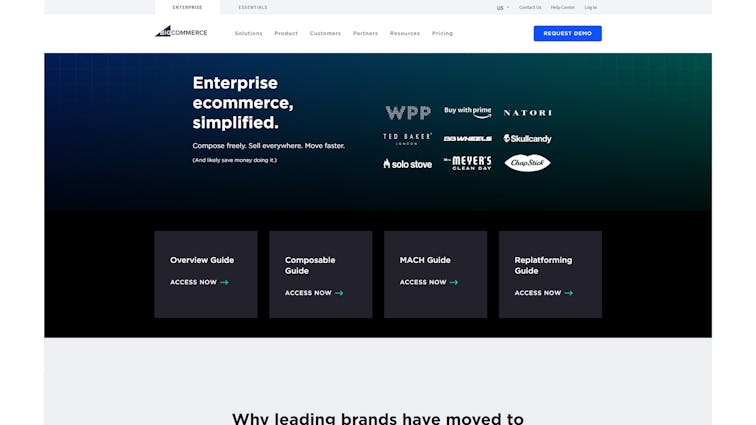
BigCommerce is a powerful e-commerce platform designed for businesses of all sizes. It offers a comprehensive set of features to help you build, manage, and grow your e-commerce website.
With robust functionality, scalability, and flexibility, BigCommerce is an excellent alternative to Dukaan, catering to the needs of both small businesses and large enterprises.
Key Features:
- Storefront Design: BigCommerce provides a range of customizable themes and templates to create a professional and visually appealing e-commerce website. The platform also supports headless commerce, allowing for greater flexibility in design and functionality.
- Product Management: Easily add, edit, and organize products with advanced inventory management tools. BigCommerce supports unlimited product listings, product options, and custom fields, making it easy to manage your catalog.
- Payment Processing: Integrates with various payment gateways, including PayPal, Stripe, and Authorize.net. BigCommerce also offers built-in payment solutions like BigCommerce Payments, supporting multiple currencies and secure transactions.
- Shipping and Fulfillment: Supports multiple shipping options and integrations with leading shipping providers. You can set up real-time shipping quotes, flat-rate shipping, and dropshipping to streamline your fulfillment process.
- SEO Tools: Built-in SEO features help improve your store’s visibility on search engines. BigCommerce includes customizable URLs, meta tags, and automatic sitemaps to enhance your SEO strategy.
- Analytics and Reporting: Access detailed reports and analytics to make data-driven decisions. BigCommerce provides insights into sales, customer behavior, and store performance, helping you optimize your business strategy.
- Multi-Channel Selling: Sell on various platforms like Amazon, eBay, and social media. BigCommerce supports seamless integration with these channels, allowing you to expand your reach and increase sales.
- Customer Support: 24/7 customer support is available to assist retailers with any issues. BigCommerce offers support via phone, email, and live chat, ensuring you get the help you need when you need it.
Additional Costs:
- Domain Name: A custom domain name is essential for branding and can be purchased through BigCommerce or another domain registrar. Costs typically range from INR 800 to INR 1,200 per year.
- Premium Themes: While BigCommerce offers free themes, premium themes provide additional customization and design options. Premium themes usually cost between INR 10,000 to INR 25,000.
- Apps and Plugins: Enhance your store’s functionality with premium apps and plugins from the BigCommerce App Marketplace. Costs for these add-ons vary, with many offering free and paid versions.
Pricing:
BigCommerce offers several pricing plans, each designed to cater to different business sizes and requirements:
- Standard Plan: Priced at approximately INR 3,231.68 ($39) per month, this plan is suitable for small businesses with annual sales up to $50,000. It includes unlimited products, file storage, and bandwidth, as well as essential eCommerce features like a mobile-responsive website, single-page checkout, and various payment options.
- Plus Plan: Costing around INR 6,546.22 ($79) per month, this plan is ideal for growing businesses with annual sales up to $180,000. It includes all features of the Standard plan plus additional tools to increase customer conversions, such as abandoned cart saver, stored credit cards, and loyalty programs.
- Pro Plan: Priced at approximately INR 24,883.83 ($299) per month, this plan is designed for larger businesses with annual sales up to $400,000. It includes all features of the Plus plan along with advanced features like Google customer reviews, custom product filtering, and special credit card rates.
- Enterprise Plan: For businesses with higher sales volumes and more complex needs, BigCommerce offers a custom Enterprise plan. Pricing for this plan is available upon request and includes all features of the Pro plan plus additional enterprise-level features and dedicated support for your ecommerce store.
Conclusion:
In this article, we’ve explored five of the best Dukaan alternatives and competitors that small businesses can consider in 2025.
From the user-friendly interface of Aasaan to the robust features of WooCommerce, each of these platforms offers unique advantages that cater to different business needs.
Whether you’re looking to build an online store from scratch, integrate with existing systems, or leverage advanced analytics, there is an option on this list that is worth evaluating.
By weighing the pros and cons of each platform, you can make an informed decision that aligns with your specific business requirements and helps you stay ahead of the curve in the rapidly evolving e-commerce landscape.
As you explore these Dukaan alternatives, remember to consider factors such as ease of use, scalability, customer support, and value for money.
With the right platform in place, you can streamline your online operations, enhance the customer experience, and position your business for long-term success.
Faq’s on Best alternatives and competitors to try in 2025:
1. Is Dukaan the same as Shopify?
Dukaan and Shopify are both eCommerce platforms, but they cater to different market segments and have distinct features. Shopify is a global, comprehensive eCommerce solution that offers a wide range of features and integrations for businesses of all sizes. It provides extensive customization options, a vast app marketplace, and advanced analytics. Dukaan, on the other hand, is an Indian eCommerce platform designed to enable small businesses and entrepreneurs to set up online stores quickly and easily. It focuses on simplicity and speed, offering fewer customization options than Shopify but allowing for faster store setup with minimal technical knowledge.
2. In which state is Dukaan made?
Dukaan is an Indian company, and while it operates digitally across the country, it was initially developed in the state of Karnataka. The platform was created to empower local businesses in India to transition to digital commerce with ease.
3. What are the main competitors of Dukaan in the Indian market?
In India, Dukaan’s main competitors include platforms like Shopify, which has a significant presence in the Indian market, as well as other local solutions such as Aasaan, which also provides tools for small businesses to create online stores, and Meesho, a social commerce platform that enables small businesses and individuals to sell products through social channels.








